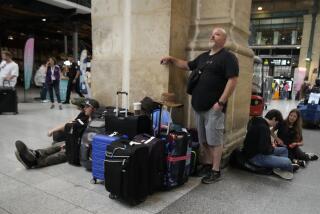4 Blasts, and a City Suddenly on Foot
- Share via
LONDON — On an ordinary day, the London Underground carries hundreds of thousands of people across the city. Some complain about delays and call the world’s oldest subway system decrepit. Still, many of the city’s 7 million residents have come to depend on the vast network.
But at 8:51 a.m. Thursday, an explosion rocked a train near Liverpool Street Station, and London’s mass transit network screeched to a halt.
Rush-hour passengers arrived at the Tube, as the city’s Underground system is called, to find station gates closed and signs saying that service had been canceled. Officials initially reported that there had been a massive power surge.
By 9:17 a.m., two more explosions had hit commuter trains between the Kings Cross and Russell Square stations and at Edgware Road Station. Half an hour later, a bomb went off in a bus at Upper Woburn Place and Tavistock Square.
London residents by the thousands suddenly had to do without the Tube. Commuters poured into the streets, crowding the sidewalks and parks, making their way on foot, trying in vain to hail a taxi.
Any other day, Rozina Ali, a 36-year-old plastic surgeon at a children’s hospital, would have taken the subway home from work. Thursday evening, she walked home in the pouring rain after spending the day operating on victims from the bombing near Russell Square Station.
On Saturday, when she returns to work, Ali will have little choice but to take the Underground train -- if it’s working.
“I will have to use the Tube, and so I will,” she said.
The Underground, known as the Tube because of the shape of its tunnels, serves more than 270 stations, running above and below ground. Its 12 lines cover 253 miles of greater London and make 3 million passenger trips a day.
The world’s first urban underground passenger railway, it opened in 1863. Many of the stations were used as air-raid shelters during World War II, especially when the Nazis bombed London in the Blitz.
London’s subway system has been a terrorist target in the past. The Irish Republican Army, the armed group opposing British rule in Northern Ireland, repeatedly planted small bombs on the system but never with the devastating effect of Thursday’s explosions. Usually such bombings were preceded by warnings to authorities.
In 2002, 14 months after the Sept. 11 attacks in the United States, three North African men were arrested in London on charges of plotting to attack the Tube.
In 2003, London’s emergency services staged a mock chemical attack on an Underground station, designed to simulate a terrorist attack in the Japanese capital. In the 1995 assault, the Aum Supreme Truth cult released sarin gas in the Tokyo subway, killing 12 people and injuring 5,000.
Since then, British media have reported that the government has secretly staged several similar exercises.
Last August, a female suicide bomber wearing a device packed with metal bolts killed 10 people and injured dozens more near a Moscow subway station.
After the bombing of aboveground trains in Madrid last year, the British media expressed fears that chaos would ensue if a terrorist attack struck London’s Underground. Transport police lacked funds and resources to cope with terrorism, and police radios would not work so deep underground, the Guardian newspaper reported.
Signs were posted on trains warning travelers to watch for unattended bags and suspicious packages: “Don’t touch, check with other passengers, inform station staff.” Years earlier, surveillance cameras had been installed to monitor activities underground.
Limited Underground service is scheduled to resume today, London Transport Secretary Alistair Darling said, though he added, “Service is bound to be disrupted, I’m afraid, for some time to come.”
Some may not be ready to return to public transportation. “I don’t feel safe at all,” said Sean Kelly, 55. “I couldn’t relax in a bus or a Tube.” If he has to travel on one or the other, he said, “I’ll be looking over my shoulder.”
Other Londoners said they would carry on with life as usual.
“I can’t let the fear get to me,” said Damion Anderson, a 32-year-old musician. “I don’t want anyone else to let me feel that I can’t ... do my thing that I’ve done for 25 years.”
More to Read
Sign up for Essential California
The most important California stories and recommendations in your inbox every morning.
You may occasionally receive promotional content from the Los Angeles Times.











